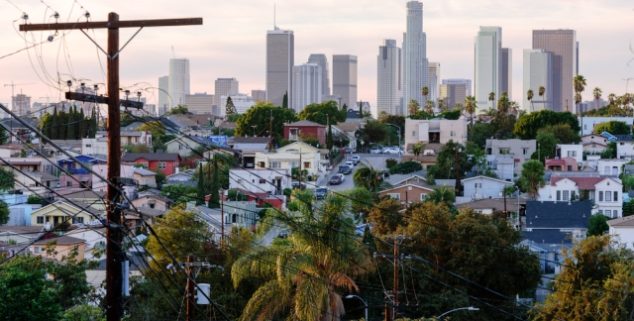Opinion
Boosting state support to working class communities makes sense
 A view of downtown Los Angeles from a nearby residential community. (Photo: Hayk_Shalunts, via Shutterstock)
A view of downtown Los Angeles from a nearby residential community. (Photo: Hayk_Shalunts, via Shutterstock)Last year was a terrible year for many working class Californians. The pandemic raged on, claiming lives, disrupting schools, and endangering workplaces, but one by one, the programs put in place to support frontline workers evaporated.
Meanwhile, the cost of basic necessities across the board – from groceries, to utility bills, to gasoline – soared.
Lawmakers should use this budget surplus to make a historic investment in frontline communities.
For the wealthiest Californians, 2021 played out very differently. Despite the economic tumult, their fortunes actually increased. Now, a portion of this pandemic-prosperity, enjoyed only by the wealthy, fills our state’s coffers.
As Californians debate how to spend the resulting $97.5 billion dollar budget surplus, lawmakers should keep this tale of two Californias in mind. We have not adequately repaid the communities and workers who kept basic services functioning throughout the pandemic – in fact, all too often, we have left the very households who sacrificed the most hanging out to dry.
To begin to address the inequality that defines California today, lawmakers should use this budget surplus to make a historic investment in frontline communities that will create the foundation for a more inclusive and just economy.
That means creating a budget framework that will support healthier and more climate-resilient communities while taking steps to address the ongoing economic and environmental consequences of structural racism.
The budget framework put forth by Gov. Newsom includes some key investments – but it also includes giveaways to polluters and climate dead ends, which will further increase the burden of pollution on communities of color and the threat of climate disasters.
Delivering for working-class communities of color that are the backbone of our state means building on the good in this budget, like clean energy investments and utility debt relief, while cutting out the bad, like money for polluting gas power plants.
California needs to cut hundreds of millions in funding for dead-end energy projects like dairy digesters, carbon capture usage and storage.
First, California must include an explicit equity commitment in the state budget to ensure that at least 40% of climate and infrastructure investments go to frontline communities.
This commitment, which is aligned with the Biden administration’s Justice40 Initiative and AB 2419, a California bill that just passed through the California Assembly this week, will begin to address a long history of racist policy that has placed polluting industries, major roadways, and fossil fuel extraction sites in communities of color.
Second, California needs to cut hundreds of millions in funding for dead-end energy projects like dairy digesters, carbon capture usage and storage, hydrogen, gas power plants, and diesel backup generators. These climate policy dead-ends will increase, not decrease, air pollution in communities of color.
Instead, California should invest in clean and distributed energy solutions that bring economic and health relief for frontline communities while also contributing to a safer and more reliable grid.
The $1 billion investment for community solar and storage projects – which would be created by the AB 2316 Community Renewable Energy Program – would go a long way in ensuring that low-income customers can access and meaningfully benefit from clean energy right in their neighborhood through reduced utility bills and cleaner air.
Gov. Newsom’s budget framework includes $1.2 billion for energy debt relief – an urgently-needed lifeline for low-income Californians.
Third, state lawmakers must protect and expand proposed budget investments that will increase economic security, boost resilience, and cut air pollution in working class communities.
Gov. Newsom’s budget includes $170 million for creating community resilience centers at trusted community spaces like libraries, health clinics, and schools where residents can access cooling, clean air, backup power, and ongoing public services. Community resilience centers meet a foundational gap in climate resilience – this funding should be increased to $1 billion to bring this lifesaving resource to vulnerable communities across the state.
To boost resilience in the face of extreme heat, Gov. Newsom’s budget framework also includes close to $1 billion to upgrade the homes of low-income Calfiornians with highly-efficient electric heat pumps for cooling, along with other upgrades like sealing, weatherization, and energy efficiency that can lock in more affordable energy bills. These whole-home upgrades will help keep households safe as extreme heat days become more common, while cutting the pollution that is fueling this crisis.
We look forward to partnering with the governor’s office and the Legislature to ensure this investment creates safer, healthier homes for those most vulnerable and includes strong tenant protections and anti-displacement measures along with meaningful engagement with community-based organizations.
Finally, Governor Newsom’s budget framework includes $1.2 billion for energy debt relief – an urgently-needed lifeline for low-income Californians facing utility bills that have doubled for some households, as fossil fuel energy prices push up costs. No Californians should have to choose between keeping the lights on and putting food on the table – to meet the scale of the need, California should increase this investment to more than $2 billion.
California lawmakers must not squander this opportunity to deliver investments that will truly protect against the climate crisis while meaningfully improving the lives of working-class communities – show us where your priorities lie.
—
Editor’s Note: Mabel Tsang is interim co-director of the California Environmental Justice Alliance (CEJA) and CEJA Action. Zach Lou is a coalition manager for the California Green New Deal Coalition.
Want to see more stories like this? Sign up for The Roundup, the free daily newsletter about California politics from the editors of Capitol Weekly. Stay up to date on the news you need to know.
Sign up below, then look for a confirmation email in your inbox.
